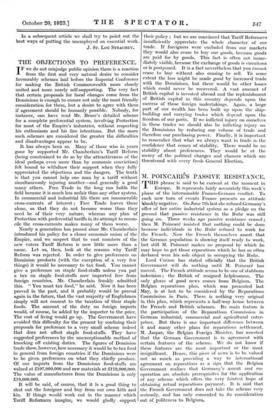THE OBJECTIONS TO PREFERENCE.
IF we do not misjudge public opinion there is a reaction from the first and very natural desire to consider favourably schemes laid before the Imperial Conference for making the British Commonwealth more closely united and more nearly self-supporting. The very fact that certain proposals for fiscal changes come from the Dominions is enough to ensure not only the most friendly consideration for them, but a desire to agree with them if agreement should be humanly possible. Nobody, for instance, can have read Mr. Bruce's detailed scheme for a complete preferential system, involving Protection for most of the Empire's industries, without respecting his enthusiasm and his fine intentions. But the more such schemes are considered the greater the difficulties and disadvantages appear to be.
It has always been so. Many of those who in years gone by supported Mr. Chamberlain's Tariff Reform (being constrained to do so by the attractiveness of the ideal perhaps even more than by economic conviction) felt bound to withdraw their support when they fully appreciated the objections and the dangers. The truth is that you cannot help one man by a tariff without simultaneously injuring another—and generally a good many others. Free Trade in the long run holds the field because it is much less unfair than any other system. In commercial and industrial life there are innumerable cross-currents of interest ; Free Trade leaves these alone, so that they do not become worse than they need be of their very nature, whereas any plan of Protection with preferential tariffs in its attempt to recon- cile the cross-currents makes many of them worse.
Nearly a generation has passed since Mr. Chamberlain introduced his policy for a closer economic union of the Empire, and we suspect that to vast numbers of the new voters Tariff Reform is now little more than a name. Let us, then, look at the reasons why Tariff Reform was rejected. In order to give preferences on Dominion products (with the exception of a very few things) it would be necessary to tax food. You cannot give a preference on staple food-stuffs unless you put a tax on staple food-stuffs now imported free from foreign countries. Mr. Chamberlain frankly admitted this. " You must tax food," he said. Now it has been proved in the past, and it probably would be proved again in the future, that the vast majority of Englishmen simply will not consent to the taxation of their staple foods. The amount of the duty on foreign imports would, of course, be added by the importer to the price, The cost of living would go up. The Government have avoided this difficulty for the present by confining their proposals for preference to a very small scheme indeed that does not affect staple food-stuffs. They have suggested preferences by the unexceptionable method of knocking off existing duties. The figures of Dominion trade show, however, how necessary it would be to tax food in general from foreign countries if the Dominions were to be given preferences on what they chiefly produce. Of our imports from the Dominions food-stuffs are valued at £197,000,000 and raw materials at £113,000,000. The value of manufactures from the Dominions is only £19,000,000.
It will be said, of course, that it is a good thing to shut out the foreigner and buy from our own kith and kin. If things would work out in the manner which Tariff Reformers imagine, we would gladly support their policy ; but we are convinced that Tariff Reformers insufficiently appreciate the whole character of our trade. If foreigners were excluded from our markets they would also cease to buy our goods, because goods are paid for by goods. This fact is often not imme- diately visible, because the exchange of goods is circuitous or is postponed. It is a fact nevertheless that you cannot cease to buy without also ceasing to sell. To some extent the loss might be made good by increased trade with the Dominions, but there would be other losses which could never be recovered. A vast amount of British capital is invested abroad and the replenishment of British capital in this country depends upon the success of those foreign undertakings. Again, a large part of our wealth has been built up upon the ship- building and carrying trades which depend upon the freedom -of our ports. If we inflicted injury on ourselves in these trades we should also be inflicting injury on the Dominions by reducing our volume of trade and therefore our purchasing power. Finally, it is important to remember that what we always want in trade is the confidence that comes of stability. There would be no stability about preferences. They would be at the mercy of the political changes and chances which are threatened with every fresh General Election.










































 Previous page
Previous page